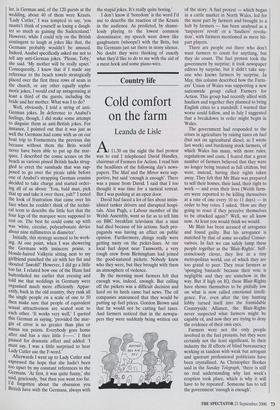Country life
Cold comfort on the farm
Leanda de Lisle
At 11.30 on the night the fuel protest was to end I telephoned David Handley, chairman of Farmers for Action. I read him the headlines of the following day's news- papers. The Mail and the Mirror were sup- portive, but said 'enough is enough'. There was a pause from David. I said that I too thought it was time for a tactical retreat. But I was pushing at an open door.
David had faced a lot of lies about intim- idated tanker drivers and disrupted hospi- tals. Alan Pugh, a Labour member of the Welsh Assembly, went so far as to tell him on BBC breakfast television that a man had died because of his actions. Such pro- paganda was having an effect on public opinion. Furthermore, .things really were getting nasty on the picket-lines. At our local fuel depot near Tamworth, a very rough crew from Birmingham had joined the good-natured pickets. Nobody knew who they were, but they brought with them an atmosphere of violence.
By the morning most farmers felt that enough was, indeed, enough. But calling off the pickets was a difficult decision and hard on its heels came bad news. The oil companies announced that they would be putting up fuel prices. Gordon Brown said that he would not be cutting fuel taxes. And farmers noticed that in the newspa- pers they were suddenly being written out of the story. A fuel protest — which began in a cattle market in North Wales, led for the most part by farmers and brought to a halt by farmers — has been analysed as a `taxpayers' revolt' or a 'hauliers' revolu- tion', with farmers mentioned as mere bit- part players.
There are people out there who don't want farmers to count for anything, but they do count. The fuel protest took the government by surprise; it took newspaper editors by surprise, but it didn't take any- one who knows farmers by surprise. In May, this column described how the Farm- ers' Union of Wales was supporting a new nationwide group called Farmers for Action. This group had recently allied with hauliers and together they planned to bring English cities to a standstill. I warned that worse could follow, and in July I suggested that a breakdown in order might begin in Wales.
The government had responded to the crises in agriculture by raising taxes on fuel (but not on agricultural diesel, as I wrote last week) and burdening stock farmers, of which Wales has many, with more rules, regulations and costs. I feared that a great number of farmers believed that they were no longer being treated as full citizens, but were, instead, having their rights taken away. They felt that Mr Blair was prepared to sell their homes, their land, their right to work — and even their lives (Welsh farm- ers were reported to be killing themselves at a rate of one every 10 to 11 days) — in order to buy votes. I asked, 'How are they going to react if they perceive themselves to be attacked again?' Well, we all know now. At least you would think we would.
Mr Blair has been accused of arrogance and found guilty. But his arrogance is matched by that of some so-called Conser- vatives. In fact we can safely lump these people together as the `Blair-Rights'. Self- consciously clever, they live in a tiny metropolitan world, out of which they are too grand to peer. They treat farmers as `sponging bastards' because their vote is negligible and they are somehow in the way. But if high on IQ, these Blair-Rights have shown themselves to be pitifully low on what is now called emotional intelli- gence. For, even after the tiny hunting lobby turned itself into the formidable Countryside Alliance, the Blair-Rights never suspected what farmers might be capable of, and now they are trying to deny the evidence of their own eyes.
Farmers were not the only people involved in the fuel protests, but they were certainly not the least significant. In their industry the ill effects of blind bureaucracy working in tandem with weak but arrogant and ignorant professional politicians have been crystallised. As Christopher Booker said in the Sunday Telegraph, 'there is still no real understanding why last week's eruption took place, which is why it will have to be repeated'. Someone has to tell the government 'enough is enough'.






















































































 Previous page
Previous page